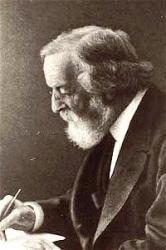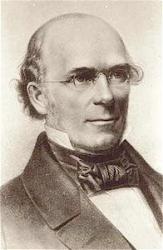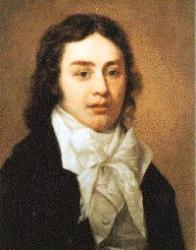Planning worship?
Check out our sister site, ZeteoSearch.org,
for 20+ additional resources related to your search.
- |
User Links
Person Results
‹ Return to hymnal




Export as CSV
James Freeman Clarke

1810 - 1888 Hymnal Number: d61 Author of "Adoration" in Heart and Voice Clarke, James Freeman, D.D., is a grandson of James Freeman (q. v.)> from whom he was named. He was born at Hanover, New Hampshire, April 4, 1810, and graduated at Harvard College, in Arts, in 1829, and in Divinity, 1833. Receiving ordination as a Unitarian Minister, he was Pastor at Louisville, Kentucky, from 1833 to 1840; of the Church of the Disciples, Boston, from 1811 to 1830; and also from 1853. Dr. Clarke for some time edited, whilst at Louisville, The Western Messenger, and is the author of Orthodoxy, its Truths and Errors, 1866; The Christian Doctrine of Forgiveness, 1852; The Christian Doctrine of Prayer, 1854, and other works. In 1844 he published the Hymn Book for the Church of the Disciples. This he enlarged in 1852. To each edition be contributed five hymns. Of these ten hymns five are found in the Lyra Sacra Americana The best known of Dr. Clarke's hymns are:—
1. Father, to us Thy children, humbly kneeling. [thoughts desired.] Dr. Clarke says this was manufactured from:—
2. Infinite Spirit, who art round us ever. [Holy thoughts desired], “which was written in Kentucky about 1833, and printed in the Dial soon after."
3. Brother, hast thou wandered far! [The Prodigal Son.] This appeared in his Disciples' Hymn Book, 1844, and is somewhat extensively used. It appeared in an Brother abbreviated form as, "Hast thou wasted all the powers?" beginning with stanza ii., in Hymns for the Church of Christ, Boston, 1853; Beecher's Plymouth Collection, 1855, and subsequently in others in Great Britain and America. The next three are also in one or two English collections.
4. To Thee, 0 God, in heaven. [Holy Baptism.] 1844.
5. To Him who children blessed. [Holy Baptism.] 1844.
6. Friend, whose presence in the house. [Christ's presence desired.] 1855. The beauty and value of this last hymn have been partly, and deserve to be more fully, recognized. It is found in Lyra Sac. Amer., which also has the following on "The Protestant Reformation":—
7. For all Thy gifts we praise Thee, Lord. This hymn was sung at the collation given by the Unitarians of New York and Brooklyn to the Members of the Convention assembled in the former city, Oct. 22, 1845. As originally written it contained 8 stanzas; the last two are omitted from both Lyra Sac. Americana and Putnam's Singers and Songs of the Liberal Faith. [Rev. F. M. Bird, M.A.]
--John Julian, Dictionary of Hymnology (1907)
James Freeman Clarke
Theodore Parker

1810 - 1860 Hymnal Number: d196 Author of "The way, the truth, the life" in Heart and Voice Parker, Theodore, M.A., was born at Lexington, Massachusetts, Aug. 24, 1810; laboured with his father as a farmer and mechanic; entered Harvard College in 1830, but continued his work at home and attended the College for examinations; attended the Divinity School from 1834 to 1836, and became pastor of the Unitarian congregation in West Roxbury, June 21, 1837. He received the degree of M.A. from his College in 1840. Changes in his theological views led him to undertake the pastorate of a congregation in Boston, in January 1846. He continued his writing, preaching, and lecturing till 1859, when bleeding at the lungs compelled him to seek relief in Europe. He died at Florence, May 10, 1860. His publications were numerous, and have been republished in Great Britain. An extended list is given, together with 12 poetic pieces, in Putnam's Singers and Songs of the Liberal Faith, Boston, U. S. A., 1875. His life has been published by Weiss, and by Frothingham. A few of his poetical pieces are given in American Unitarian hymn-books.
These include :—
1. In darker days and nights of storm. Almighty Love. "Introduced in a sermon which Mr. Parker preached, entitled ‘The Practical Effects of the Ecclesiastical Conception of God.’”
2. 0 Thou great Friend of all the sons of men. Jesus the Way, the Truth, and the Life. This in the original is a sonnet. Altered for use as a hymn, it is widely used by American Unitarian; and is also given in some English hymnbooks.
-- John Julian, Dictionary of Hymnology (1907)
Theodore Parker
Samuel Taylor Coleridge

1772 - 1834 Person Name: S. T. Coleridge Hymnal Number: d54 Author of "Ere on my bed my limbs I lay" in Heart and Voice Coleridge, Samuel Taylor, was born at St. Mary Ottery, Devonshire, 1772, educated at Christ's Hospital, London, and Jesus College, Cambridge, and died in 1834. His Child's Prayer at Evening, "Ere on my bed my limbs I lay," in Martineau's Hymns, 1840 and 1873, is dated 1808.
--John Julian, Dictionary of Hymnology (1907)
=================
Samuel Taylor Coleridge; 21 October 1772 – 25 July 1834) was an English poet, Romantic, literary critic and philosopher who, with his friend William Wordsworth, was a founder of the Romantic Movement in England and a member of the Lake Poets. He is probably best known for his poems The Rime of the Ancient Mariner and Kubla Khan, as well as for his major prose work Biographia Literaria. His critical work, especially on Shakespeare, was highly influential, and he helped introduce German idealist philosophy to English-speaking culture. He coined many familiar words and phrases, including the celebrated suspension of disbelief. He was a major influence, via Emerson, on American transcendentalism.
Throughout his adult life, Coleridge suffered from crippling bouts of anxiety and depression; it has been speculated by some that he suffered from bipolar disorder, a condition as yet unidentified during his lifetime. Coleridge suffered from poor health that may have stemmed from a bout of rheumatic fever and other childhood illnesses. He was treated for these concerns with laudanum, which fostered a lifelong opium addiction.
--excerpt from en.wikipedia.org
Samuel Taylor Coleridge
Seth C. Brace
1811 - 1897 Hymnal Number: d155 Author of "Temperance hymn" in Heart and Voice Brace, Seth Collins, son of the Rev. Joab Brace, was born at Newington, Connecticut, Aug. 3, 1811, and entered the Presbyterian ministry in 1842, but subsequently joined the Congregationalists. His Temperance hymn, “Mourn for the thousands slain," is widely used. It was written in 1843, and included in the Philadelphia Parish Hymn, 1843, with others which he wrote on the same subject, under the signature of "C."
--John Julian, Dictionary of Hymnology, Appendix, Part II (1907)
Seth C. Brace
Loammi J. Ware
Hymnal Number: d183 Author of "O holy father bless us with thy blessing" in Heart and Voice
Loammi J. Ware
William Henry Furness

1802 - 1896 Hymnal Number: d27 Author of "Blessing [blessings] on thee, gracious Lord" in Heart and Voice Furness, William Henry, D.D., born in Boston, 1802, and graduated at Harvard in Arts and Theology, 1820. From 1825 he has been an Unitarian Pastor in Philadelphia. He is an accomplished scholar, and has been an active worker in reforms of various kinds. His publications are numerous and
include a Manual of Domestic Worship, 1840, and a translation of Schiller's Song of the Bell.
His hymns are somewhat numerous, and several of them have great merit. The best and most widely used are:—
1. Father in heaven, to Thee my heart. Resignation. Appeared in The Christian Disciple, 1822. It was repeated in this form in some of the older collections, and a few modern hymnals, including the Boston Unitarian Hymns [& Tune] Book, 1868. In 1846 it was given in Longfellow and Johnson's Book of Hymns as "Father in heaven, to Whom our hearts;" again in their Hymns of the Spirit, 1864, and in Dr. Martineau's Hymns of Praise & Prayer, 1873. This hymn is sometimes ascribed to "H. Ware," but in error.
2. Feeble, helpless, how shall I? Jesus our Leader. First published in the Cheshire Unitarian Christian Hymns, 1844, No. 272, in 5 stanzas of 4 lines. It is in several modern collections, including Lyra Sacra Americana, 1868: Thring's Collection, 1882.
3. Have mercy, 0 Father. Divine direction desired. Contributed to Dr. Martineau's Hymns of Praise and Prayer, 1873, in 2 stanzas of 6 lines.
4. Here in a world of doubt. Psalms xlii. Contributed to the N. Y. Lutheran Collection, 1834, and repeated in his Manual of Domestic Worship, 1840, Martineau's Hymns, &c, 1873.
5. Here in the broken bread. Holy Communion. Appeared in the Appendix to the Philadelphia Unitarian Collection, 1828. It is in a few modern collections, including the Boston Unitarian Hymn [and Tune] Book, 1868.
6. Holy Father, Gracious art Thou. Purity & Peace. Contributed to Dr. Martineau's Hymns, &c, 1873, in 1 stanza of 12 lines.
7. I eel within a want. Likeness to Christ desired. Appeared in the Cheshire (U. S.) Unitarian Christian Hymns, 1844, No. 687, in 4 stanzas of 4 lines. It is in a few collections both old and new.
8. In the morning I will raise [pray] . Morning. Appeared in his Manual of Domestic Worship, 1840, in 6 stanzas of 4 lines, and repeated in Dr. Martineau's Hymns, &c, 1873. In Longfellow and Johnson's Book of Hymns, 1846, and the Boston Unitarian Hymn [& Tune] Book it begins with stanzas ii., "In the morning I will pray."
9. 0 for a prophet's fire. Holy Communion. Published in the Appendix to the Philadelphia Unitarian Collection, 1828, and repeated in the Cheshire (U. S.) Unitarian Christian Hymns, 1844, and later hymn-books.
10. Richly, O richly have I been. The Prodigal Son. In his Manual of Devotion, 1840. In Longfellow and Johnson's Book of Hymns, 1846, and their Hymns of the Spirit, 1864, it is given as "O richly, Father, have I been"; whilst in Hedge & Huntington's Hymns for the Church of Christ, 1853, the Boston Unitarian Hymns [and Tune] Book, 1868, and others, it opens with stanzas ii., "Unworthy to be called Thy son."
11. Slowly by Thy [God's] hand unfurled. Eternal Light. Given in his Manual of Domestic Worship, 1840, and repeated in a few hymnals. In Drs. Hedge & Huntington's Hymns for the Church of Christ, 1853, the first line was changed to “Slowly by God's hand unfurled." This is the reading of the Boston Unitarian Hymn [& Tune] Book, 1868. Dr. Martineau retains the original reading in his Hymns, &c, 1873.
12. Thou only Living, only True. Ordination. In Dr. Martineau's Hymns, &c, 1873, where it is dated 1868.
13. To the High and Holy One. Consecration of Church. In Lyra Sacra Americana, 1868. From this is taken "To the truth that makes us free" (stanzas ii.), in the Boston Hymns of the Spirit, 1864.
14. What is the world that it should share? Invocation of the Spirit. Given in The Christian Disciple, 1822, and Dr. Martineau's Hymns, &c, 1873. It begins with stanza ii. of his hymn "Here in Thy temple, Lord, we bow." In Lyra Sacra Americana it reads, "Oh, is there aught on earth to share."
15. What is this that stirs within? The Soul. Appeared in his Manual of Domestic Worship, 1840. In 1844 it passed into the Cheshire (U.S.) Unitarian Christian Hymns, No. 318, and later into numerous collections, both old and new. Furness died in 1896. [Rev. F. M. Bird, M.A.]
--John Julian, Dictionary of Hymnology (1907)
===================
Furness, W. H., p. 402, ii. His Verses, Translations, and Hymns were published 1886. Of his hymns the following, in addition to those on pp. 402-3, have come into common use:—
1. She is not dead, but sleepeth. [Death and Burial.]
2. That God is Love, unchanging Love. [God is Love.] This is in several American collections, including the Boston Unitarian Hymns for Church and Home, 1895, where it is dated 1892.
3. Thou Who dost all things give. [Seeing the Unseen.] This is dated in The Pilgrim Hymnal, 1904, as having been written in 1860. It is from the Author's Verses, &c, 1886. Also in Border's Treat. of Amer. Sacred Song, 1896.
Dr. Furness was b. April 20, 1802, and d. in 1896.
--John Julian, Dictionary of Hymnology, New Supplement (1907)
William Henry Furness
Thomas William Parsons
Person Name: T. W. Parsons Hymnal Number: d223 Author of "Should autumn's golden days depart" in Heart and Voice
Thomas William Parsons


 My Starred Hymns
My Starred Hymns


